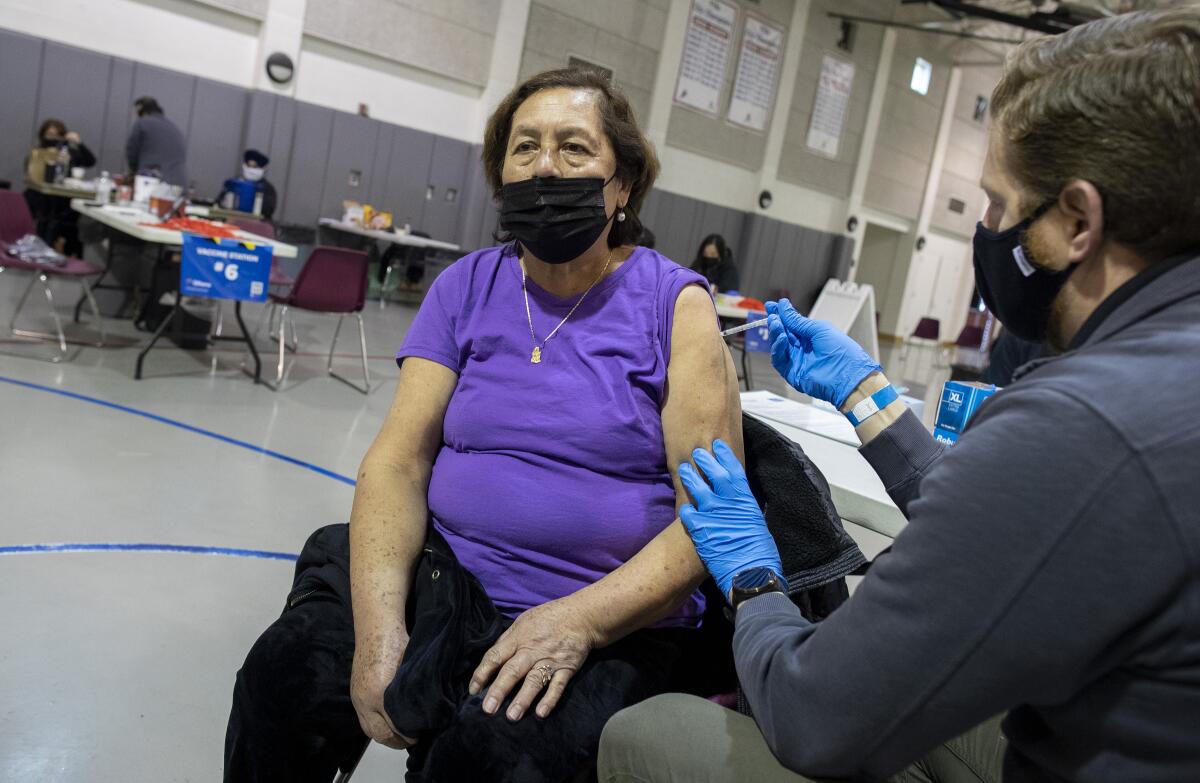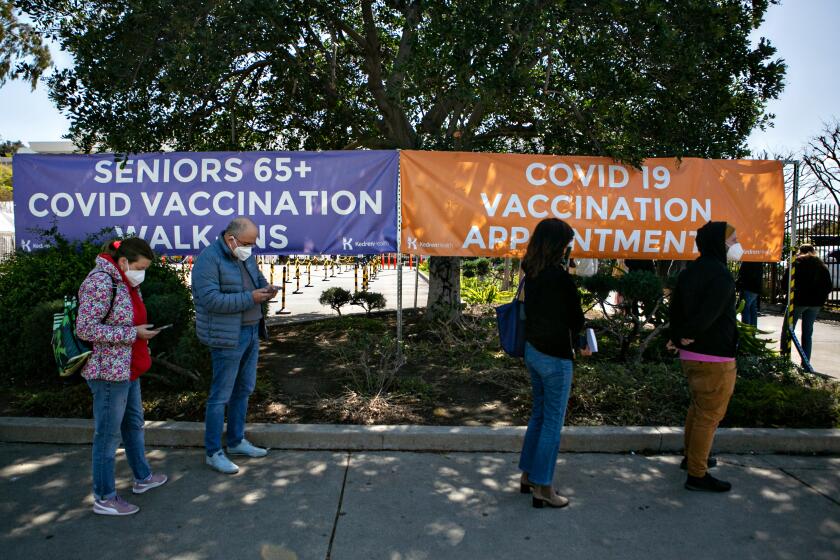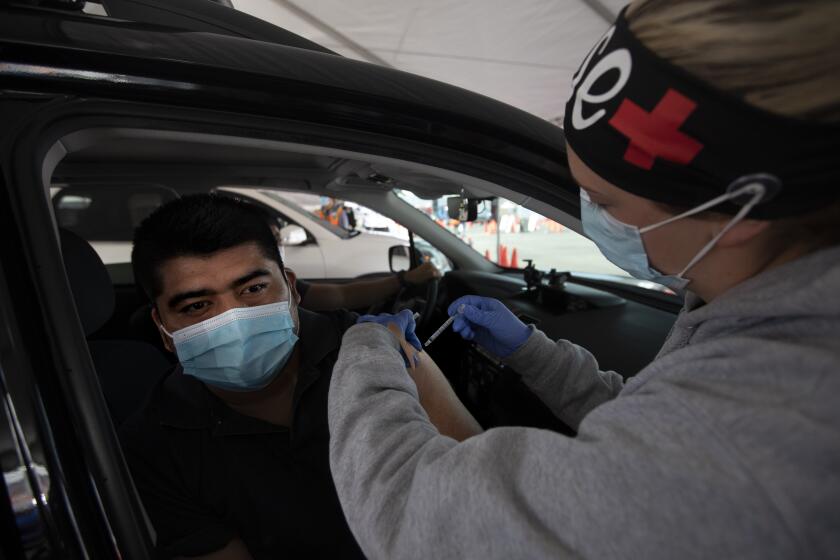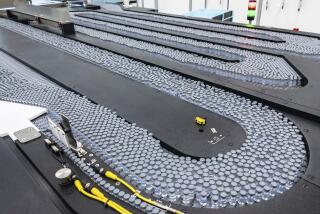When will California get more COVID-19 vaccine? Here’s what we know

- Share via
Supplies of COVID-19 vaccines in California continue to be in short supply as millions more people became eligible for it this week.
But officials said they are hopeful that more vaccine is coming and that California could soon loosen eligibility rules and allow even more people to get shots.
The big questions is when.
Here is what we know:
Where do we stand now?
Providers throughout California have administered more than 12.6 million total doses of COVID-19 vaccines — and roughly 1 in 5 residents has gotten at least one shot, Times data show.
Over the last week, an average of 286,921 doses were doled out per day statewide. Two of the available vaccines, from Pfizer-BioNTech and Moderna, require two doses, administered weeks apart.
The other, from Johnson & Johnson, entails a single shot.
California’s newest coronavirus vaccine rollout will live or die on trust and honesty. Will it work?
When can we expect more supply?
That remains the big question.
President Biden said last week that by May 1, restrictions on who can make a COVID-19 vaccine appointment will be lifted nationwide and that the current limitations no longer will be needed because vaccine supply will be adequate to meet demand. All American adults should be able to get at least a first shot by the end of May, federal officials said.
Although states set the rules for who can get shots, the federal government controls the vaccine supply; if necessary, Biden can use that authority to direct states to drop restrictions as of May 1, officials said. To speed up vaccinations, Biden will expand the pool of medical professionals allowed to administer shots to include dentists, EMTs, paramedics, physician assistants and even veterinarians. The government will double the number of community health centers and mass vaccination sites in the coming weeks.
California Gov. Gavin Newsom on Tuesday said that residents should expect to see the vaccine eligibility tiers loosen in the state.
“We’re going to be in a completely different place in six or so weeks, as we see significant increase in manufactured supply,” he said.
But it was unclear how soon the guidance for eligibility would be relaxed following Monday’s expansion, which opened priority to people with disabilities and underlying conditions, among others. The update increased the number of vaccine-eligible people in the state by millions, making nearly half of all Californians qualify for a shot.
People are being asked to follow an honor system as vaccine supplies remain limited throughout California.
Newsom noted the state’s goal to focus vaccine outreach in the hardest-hit communities remained the priority.
“Our North Star continues to be equity,” he said.
The state recently shifted its vaccine rollout to reserve about 40% of doses for the most vulnerable communities — a plan that is entwined with the state’s latest reopening strategy. Residents in marginalized communities have been disproportionately affected by the pandemic.
Many are wondering when California might allow people 50 and older to get vaccinated.
“It’s too soon to tell,” said Dr. Tomas Aragon, director of the California Department of Public Health to KGO-TV. “We’re going to look at supply, we have analysts who are projecting all of this out and we’re going to be seeing how many people are getting vaccinated. That really helps determine when we’ll make the next announcement.”
What do the next few weeks look like?
On Monday, millions more Californians — including those with underlying health conditions and disabilities — qualified to get vaccinated.
But many are expected to have to wait because there is not enough vaccine for everyone.
California is reserving 40% of its supply for people in underserved communities and 10% for teachers. And there are still many people 65 and older who are waiting for their vaccinations as well.
Further straining tight supplies: The state on Monday expanded eligibility to people who live or work in high-risk congregate residential settings, such as homeless shelters and incarceration facilities, and to public-transit and airport employees. In Los Angeles County, the entire homeless population will be eligible, regardless of shelter status.
Eligibility rules vary by county. Solano County this week opened up vaccines to anyone over 50,
The new guidance’s allowance for self-attestation clears up confusion about how high-risk people can prove their eligibility. Advocates have long pressed for a process that would not create unnecessary barriers, especially for those who are less mobile or intellectually disabled.
Under the guidelines, people do not have to disclose what condition they have, only that they are eligible.
The state guidelines for at-risk people essentially trust residents to accurately disclose their eligibility, but some officials have expressed concern that the lenient rules will be abused by people faking underlying conditions. People have forged documents and used access codes intended for high-risk communities.
Officials are urging residents to work with their healthcare providers to seek vaccinations as their first step.
“Check first with your usual healthcare provider to see if they have vaccines and available appointments. Healthcare providers who have vaccines may also begin reaching out to you, as a patient with a significant, high-risk medical condition or disability known to the provider, to schedule your vaccine appointment,” the state said.
Other options include local pharmacies, local health departments, community pop-up clinics or using the My Turn website. Access details:
- Online at myturn.ca.gov. The MyTurn website is accessible to people with disabilities and in eight languages: English, Spanish, Tagalog, Vietnamese, Mandarin, Cantonese, Korean and Japanese.
- Calling the COVID-19 hotline at (833) 422-4255 from 8 a.m.- 8 p.m. Monday-Friday or 8 a.m.-5 p.m. Saturday-Sunday.
More to Read
Sign up for Essential California
The most important California stories and recommendations in your inbox every morning.
You may occasionally receive promotional content from the Los Angeles Times.














